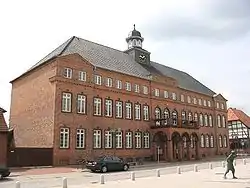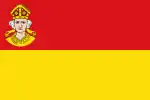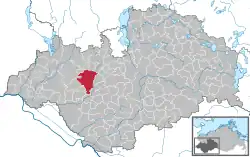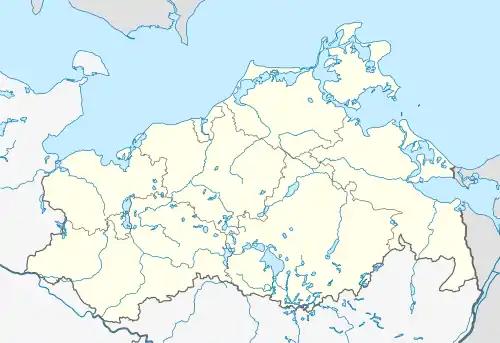Hagenow
Hagenow (German pronunciation: [ˈhaːɡəno]) is a German town in the southwest of Mecklenburg-Western Pomerania, in the district of Ludwigslust-Parchim, 30 kilometers south of Schwerin. Its population is approximately 11,300 inhabitants (2013).
Hagenow | |
|---|---|
 Town hall of Hagenow | |
 Flag  Coat of arms | |
Location of Hagenow within Ludwigslust-Parchim district  | |
 Hagenow  Hagenow | |
| Coordinates: 53°25′N 11°11′E | |
| Country | Germany |
| State | Mecklenburg-Vorpommern |
| District | Ludwigslust-Parchim |
| Government | |
| • Mayor | Thomas Möller (Left) |
| Area | |
| • Total | 67.44 km2 (26.04 sq mi) |
| Elevation | 25 m (82 ft) |
| Population (2021-12-31)[1] | |
| • Total | 12,146 |
| • Density | 180/km2 (470/sq mi) |
| Time zone | UTC+01:00 (CET) |
| • Summer (DST) | UTC+02:00 (CEST) |
| Postal codes | 19230 |
| Dialling codes | 03883 |
| Vehicle registration | LUP |
| Website | www.hagenow.de |
Hagenow is part of the Hamburg Metropolitan Region.
Sights and monuments
- Renovated old town, particularly along Lange Straße and Lindenplatz.
- Stadtkirche, built in 1875-1879 in Neo-Gothic style.
- Stadtmuseum (City Museum), located in an eighteenth-century half-timbered house.
- Städtischer Wasserturm Hagenow (watertower), 28 meters high, erected between 1905–1908 with Neo-Gothic windows. In 1938 the Luftwaffe commissioned the refurbishment of the tower.
Old synagogue
The Alte Synagoge or Hanna-Meinungen-Haus (old synagogue) is a former synagogue in the old town of Hagenow. Hirsch Samuel Meinungen purchased the plot in 1820, with the intention of building a synagogue for the then 80 person strong Jewish community in Hagenow. In 1828 the architectural complex contained a school/parish hall, a cart shed (where carts for funerals were kept), the synagogue with a Mikwe or Mikveh, a bath for the ritual immersion in Judaism. On August 15 of the same year, the solemn consecration of the temple took place.[2]
Between 1839 and 1881, Jewish families from surrounding areas (i.e. Lübtheen and Vellahn) joined the Hagenow synagogue, however due to the absence of a permanent rabbi (in 1907) and a population migration to more affluent cities, the number of members dwindled and with them the funding and sponsorships for the synagogue. The last elected leader of the community, Samuel Meinungen (grandson of Hirsch S. Meinungen) proposed that the use of the prayer house should be changed. Although Meinungen never intended to sell the building, he considered renting it out to the Catholic church, a proposal rejected by the high council.[3]
Due to the Nazi regime Meinungen and his family, including his infant daughter Hanna Meinungen (ca. 18 months), were deported to Auschwitz concentration camp, where Samuel Meinungen died on the 25.11.1937.[4] Although untraceable, it is speculated that his entire family died around this time. During the Kristallnacht (1938) most of the interior was destroyed, however due to its position within the town and the close proximity to adjacent properties,[5] the building and the Mikwe remained largely intact. Extensive restoration of the Synagogue started in 2004 and lasted until 2009. Nowadays the building is used as a community hall, a museum and a venue for special events such as exhibitions from local schools.[6]
Government
On the 14.6.2015 Die Linke (The Left party) candidate Thomas Möller replaced SPD (social democrat) Gisela Schwarz as Mayor.[7]
Notable people
- Dieter Berg (born 1966), boxer
- Roland Brinkmann (1898–1995), geologist and paleontologist
- Claudia Graue (born 1981), actress and singer
- Friedrich Heincke (1852–1929), zoologist and ichthyologist
- Adolf Hochgraefe (1896–1969), politician (SPD)
- Karl-August Kamilli (born 1945), politician (SPD in the GDR, SPD)
- Karl Koß (born 1930), author of radio plays and Low German texts
- Maria Kraus-Boelté (1836–1918), German-American educator
- Andreas von Maltzahn (born 1961), Evangelical Lutheran theologian and bishop of the Evangelical Lutheran Church in Northern Germany
- Stefan Nimke (born 1978), Olympic and world champion track cyclist
- Lukas Pägelow (born 1994), footballer (LSK Hansa)
- Carl Schmidt (1868–1938), coptologist
- Kurt Schröder (1888–1962), composer
- Michael Timm (born 1962), amateur boxer for East Germany
- Charles Nelson (businessman) (1835-1891), distiller
References
- "Bevölkerungsstand der Kreise, Ämter und Gemeinden 2021" (XLS) (in German). Statistisches Amt Mecklenburg-Vorpommern. 2022.
- Stadt Hagenow (2007), Alte Synagoge; Ein Kulturzenrum ensteht; Museum für Alltagskultur der Griesen Gegend Und Alte Synagoge Hagenow; EGS Entwicklungsgesellschaft mbH, Schwerin
- Museum der Stadt Hagenow/Freudeskreis Hagenower Museum e.V. (2000); Blätter zur Kulturgeschichte und Volkskunde Südwestmecklenburgs Nr.5; Eichenverlag Hagenow
- Stadt Hagenow (2007), Alte Synagoge; Ein Kulturzenrum ensteht; Museum für Alltagskultur der Griesen Gegend Und Alte Synagoge Hagenow; EGS Entwicklungsgesellschaft mbH, Schwerin
- Stadt Hagenow (2007), Alte Synagoge; Ein Kulturzenrum ensteht; Museum für Alltagskultur der Griesen Gegend Und Alte Synagoge Hagenow; EGS Entwicklungsgesellschaft mbH, Schwerin
- "Alte Synagoge - Freundeskreis Hagenower Museum e.V." (in German). Archived from the original on 2015-06-14. Retrieved 2015-06-21.
- "Linke-Kandidat Möller wird Bürgermeister in Hagenow". focus.de (in German).